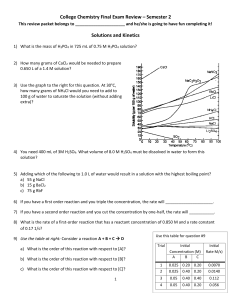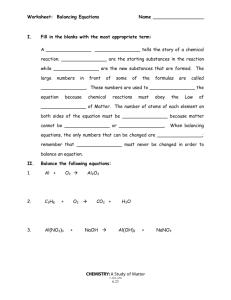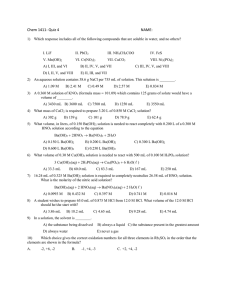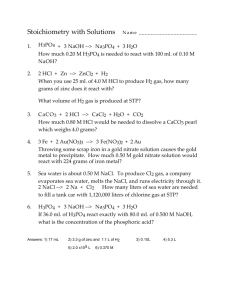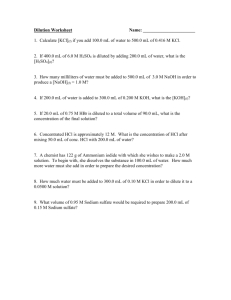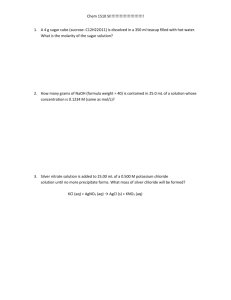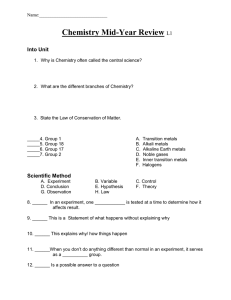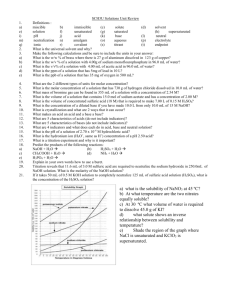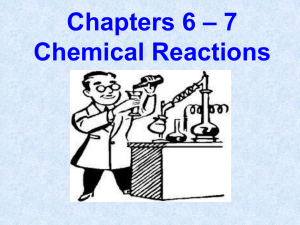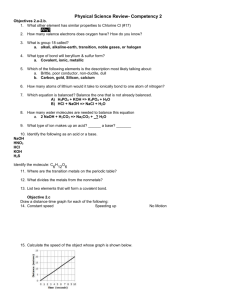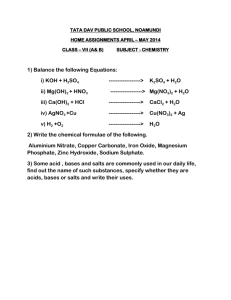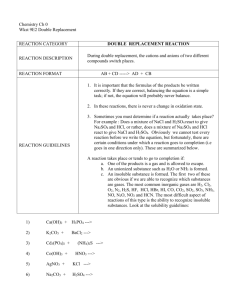Press here to view sample exam 2
advertisement
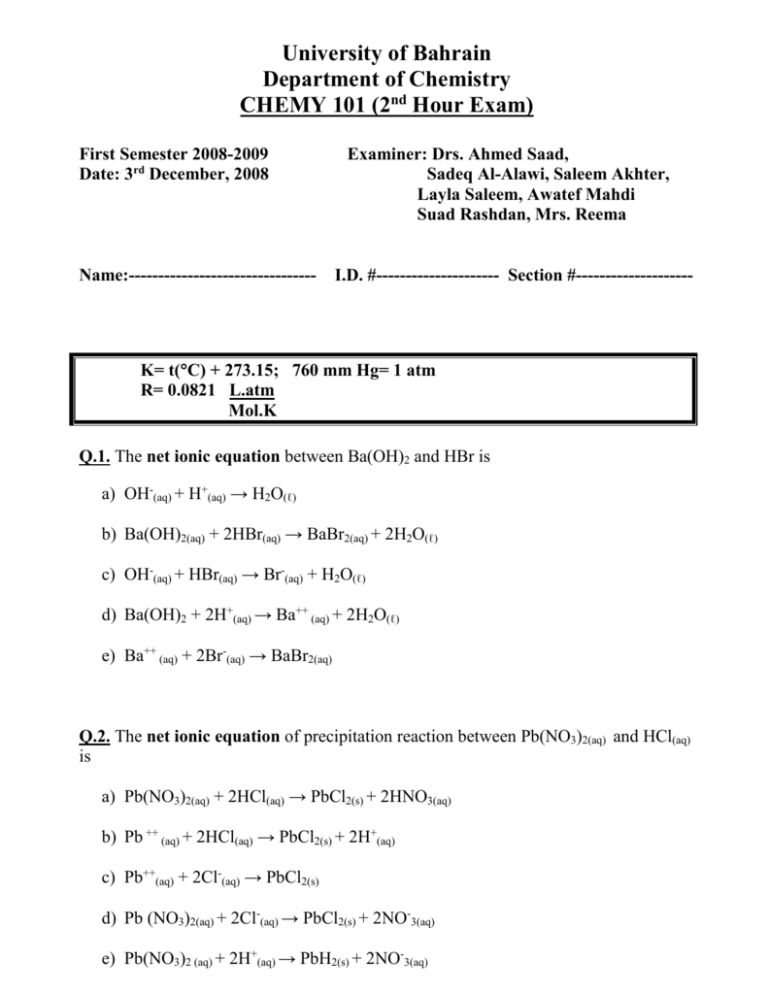
University of Bahrain Department of Chemistry CHEMY 101 (2nd Hour Exam) First Semester 2008-2009 Date: 3rd December, 2008 Name:-------------------------------- Examiner: Drs. Ahmed Saad, Sadeq Al-Alawi, Saleem Akhter, Layla Saleem, Awatef Mahdi Suad Rashdan, Mrs. Reema I.D. #--------------------- Section #-------------------- K= t(C) + 273.15; 760 mm Hg= 1 atm R= 0.0821 L.atm Mol.K Q.1. The net ionic equation between Ba(OH)2 and HBr is a) OH-(aq) + H+(aq) → H2O(ℓ) b) Ba(OH)2(aq) + 2HBr(aq) → BaBr2(aq) + 2H2O(ℓ) c) OH-(aq) + HBr(aq) → Br-(aq) + H2O(ℓ) d) Ba(OH)2 + 2H+(aq) → Ba++ (aq) + 2H2O(ℓ) e) Ba++ (aq) + 2Br-(aq) → BaBr2(aq) Q.2. The net ionic equation of precipitation reaction between Pb(NO3)2(aq) and HCl(aq) is a) Pb(NO3)2(aq) + 2HCl(aq) → PbCl2(s) + 2HNO3(aq) b) Pb ++ (aq) + 2HCl(aq) → PbCl2(s) + 2H+(aq) c) Pb++(aq) + 2Cl-(aq) → PbCl2(s) d) Pb (NO3)2(aq) + 2Cl-(aq) → PbCl2(s) + 2NO-3(aq) e) Pb(NO3)2 (aq) + 2H+(aq) → PbH2(s) + 2NO-3(aq) Q.3. Which list contains only strong acids? a) HCl, HNO3, HF, HClO4 b) H2SO4, H3PO4, HClO4, NH3 c) HCl, HNO3, H3PO4, HClO4 d) HCl, H2SO4, HClO4, HI e) HNO3, H2SO4, NaOH, H3PO4 Q.4. 5 g of unknown compound contains sulfate (SO4) 2- is treated with excess of Ba(NO3)2 gives 1.32 g of BaSO4 precipitate. What is the % of Oxygen (O) in the compound? a) 7.25% b) 3.62% c) 12.3% d) 16.6% e) 25.3% Q.5. What volume of 0.1 M of H2SO4 is needed to neutralize 25 ml of 0.05 M of NaOH H2SO4(aq) + 2NaOH(aq) → Na2SO4(aq) + 2H2O a) 12.0 ml b) 6.25 ml c) 14.3 ml d) 15.6 ml e) 24.8 ml Q.6. 15 ml of 0.1 M of HCl(aq) neutralize 20 ml of an aqueous solution of Ca(OH)2(aq) Ca(OH2)(aq) + 2HCl(aq) → CaCl2(aq) + 2H2O(ℓ) What is the Molarity of Ca(OH)2 a) 0.25 M b) 0.012 M c) 0.0375 M d) 0.062 M e) 0.085 M Q.7. 5.60 g of glucose C6H12O6 was dissolved in 600 ml of H2O (density of H2O = 1 g/ml) (density of solution = 1.1 g/ml) What is the Molarity of the solution? a) 0.0563 M b) 0.324 M c) 0.684 M d) 0.123 M e) 0.784 M Q.8. What is the molality of 0.5 M of Na2CO3 solution (density of solution= 1.2 g/ml) a) 0.12 m b) 1.26 m c) 0.88 m d) 0.44 m e) 1.65 m Q.9. What is the mole fraction of NaOH in a 36.6 % by mass of NaOH solution? a) 0.102 b) 0.612 c) 0.206 d) 0.052 e) 0.036 Q.10. What is the % by mass of NaNO3 in a 0.94 m solution? a) 17.9% b) 16.9% c) 26.3% d) 35.4% e) 7.4% Q.11. The volume of a gas is 841 ml at 62C. What is its volume if it is heated to 84C? (Suppose the pressure and no. of moles remains constant). a) 896 ml b) 377 ml c) 958 ml d) 1020 ml e) 1103 ml Q.12. The density of a gas is 1.6 g/L at 640 mm Hg and 35C. What is its density at 1.1 atm and 28C. a) 4.2 g/L Q.13. b) 2.14 g/L Given 2KClO3(s) c) 6.4 g/L d) 3.6 g/L e) 8.9 g/L 2 KCl(s) + 3O2(g) What volume of O2 was obtained at 540 mm Hg and 30C if 2.6 g of KClO3 was used up? a) 1.12 L b) 3.62 L c) 2.45 L d) 6.35 L e) 9.96 L Q.14. Given Br2(g) + 3Cl2(g) → Br2Cl6(g) What volume of Br2Cl6(g) was obtained from 6L of Br2 and 6L of Cl2 if the two gas reacted at the same temperature and pressure? a) 6L b) 2L c) 8L d) 10L e) 12L Q.15. Given NaHCO3(s) + HCl(aq) → NaCl(aq) + H2O(ℓ) + CO2(g) Suppose that 280 ml of CO2 was obtained over water at 980 mm Hg. At what temperature the gas CO2 exists if 0.012 mole of NaHCO3 was dissolved. (Vapour pressure of H2O at 28C = 23.1 mm Hg) a) 62.6C b) 52.6C c) 73.4C d) 84.8C e) 43.4C
